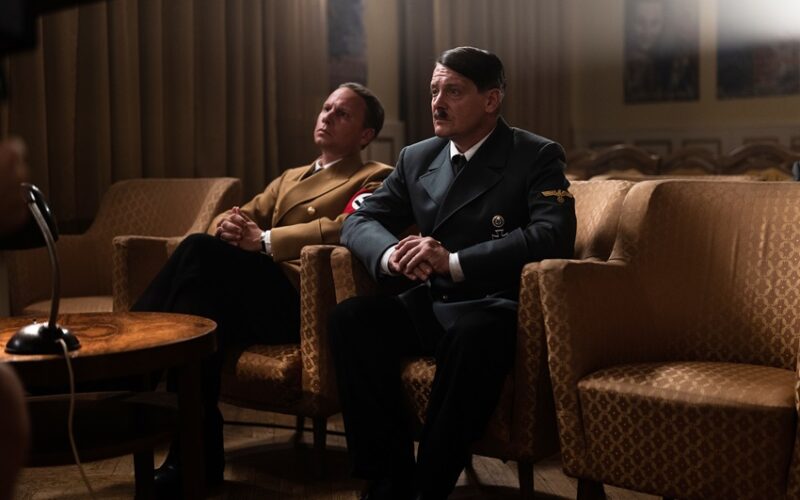Goebbels and the Führer (Lang, 2024)
Sometimes a movie hangs in the balance and you don’t know if it is a hit or miss until the end. At other times, a film may reveal itself as something you admire or not much earlier. Goebbels and the Führer is, unfortunately, one of those films that pretty much lost me in the first five minutes.
The film begins with a series of intertitles of questionable value and accuracy. Rather than providing context for what we are about to watch, the filmmakers engage in metacommentary, claiming that the film “shows what has never been shown before” and lauding themselves for taking the “risky” strategy of showing a film from the perspective of its protagonist.
As to the first…well I guess that is true in the literal way that it is true of every film. (I was reminded of a college essay about “weasel words” in arts and advertising, words that implied more than they actually say.) Did they discover some previously lost speech or something that had “never before” been revealed? Or is the insinuation that what has never been shown (not just in a film but anywhere) is that Nazi Germany used propaganda?
As to it being risky? I don’t know. There are a lot of great works of art that present ugly truths about life or history by letting the evil words and works of evil people speak for themselves. Thing is, these are usually successful to the extent they trust the audience is intelligent enough to identify them as evil without having to have those words and actions labeled for them. The “risky” claim reeks of fear of criticism, which didn’t give me much confidence. Perhaps the tone doesn’t translate from the German, but the tone that comes across is of the filmmakers wringing their hands and saying, “If we let Hitler speak for himself, we run the risk of people not realizing we are condemning him!”
Really? I mean, this stance would be unfortunate in any historical piece about the Nazis, but in one about propaganda it sends the mixed message that it wants to explain propaganda to those it fears would be so easily fooled by it that they would not descry it.
After that opening, the film feels ill-conceived, but its execution is also strangely hard to understand. The film claims to rely heavily on the actual words of the characters depicted, but it shows them in dialogue rather than written archives. Hence the screenplay often sounds like someone (using Goebbels) reading a prepared speech or book rather than having a conversation with the other people on screen. “We are as truthful as is useful”; “Propaganda is like art”: “A good government cannot exist without propaganda–and vice-versa.” I have no doubt that Goebbels said these things — or words like them — he gave plenty of public speeches that recorded the ideas the film is attempting to dramatize. But there is a difference between an accurate documentary and a dramatization, and the film can’t decide which it wants to be.
This flaw is also seen in the Zelig-like integration of archival footage with dramatic footage. You’ve seen this technique before. Characters are meticulously dressed and made up to be consistent with newsreel footage. They speak on one side of a door or balcony, the famous character (in this case Hitler) steps through the edge of the film frame and the film cuts to…the actual footage of the actual event! It is not my claim that this technique is inherently artless or immoral or misleading, just that it (the style) doesn’t suit the film that it is being used in.
At least, I don’t think it does. I’m not very confident what style would better suit the film, since I am not sure what the film is going for. If it wanted to be a historical drama about the relationship between propaganda and fascism, I would have been willing to cut it some slack about its editing. If it wanted to be a documentary that provided information/context about how Goebbels conceptualized and justified propaganda, I would have forgiven some its pacing problems. But it waffles back in form between the two and ends up being neither an effective drama nor an illuminating exposition.

